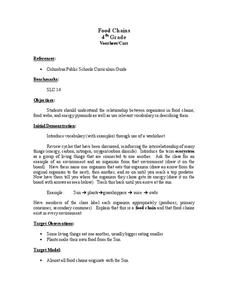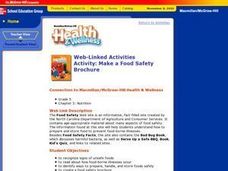Curated OER
Marine Ecosystems
Students identify producers and consumers and construct a food chain from four marine ecosystems. They describe the delicate balance among organisms in each environment. In groups, students discuss the human activities that upset the...
Curated OER
FOOD FOR THE ANCESTORS
Learners identify the foods associated with the "Days of the Dead Celebration." They compare and contrast these foods to the foods associated with American celebrations and become familiar with the foods of Mexico and their relationship...
Curated OER
Ecosystem Interactions in Refuges
Seventh graders, using national parks as models, illustrate the energy flow in ecosystems. Working in groups, they use murals, flow charts, or other visual displays to record their findings. Students represent the food chains and webs...
Curated OER
Rainforest Food Chain
Young scholars investigate a rainforest food chain. For this ecology lesson, students are shown pictures of plants and list what animals might eat the plants. Young scholars continue to think of what other animals might eat those...
Curated OER
Food Chains and Food Webs
Students discuss the characteristics of producers, consumers and decomposers. Using a flow chart, they construct a food chain to visually show how organisms with different energy sources depend upon one another. Students explore a...
Curated OER
Figuring Out Food Labels
Students identify various sources of nutritional information and evaluate accuracy of messages. They comprehend and identify misrepresentations in current food labeling. Pupils evaluate specific consumer products for truth in labeling....
Curated OER
Food Safety-Consumers Need the Facts
High schoolers begin by completing a survey asking them to rank their concerns about commercially prepared foods. They develop a definition of relative risk, and complete the "Pro or Con" worksheet. Students work in groups to make a...
Curated OER
My Colorful Food Chain
Students explore biology by participating in a dietary habit activity. In this food chain lesson, students discuss their own diets and the animals we feed upon daily. Students create a poster demonstrating the animals that we feed upon...
Curated OER
Arctic Food Web
Students research animals found in the arctic. They discuss what living things need in order to survive and where they get their food. Students discuss the difference between producers and consumers and create a food web for animals in...
Curated OER
Food Chains
Fourth graders investigate food chains. They review cycles and discuss ecosystems. They select an environment and create a food chain in small groups. They write their food chain and label it for the class to evaluate. They create...
Curated OER
Forest Food Web
Students explore the elements of a forest ecosystem. They examine the elements needed to form a forest food web. Students construct and describe food webs that include nonliving elements of the ecosystem.
Curated OER
Make a Food Safety Brochure
Students create brochures that inform their families how to prepare and store food to prevent food-borne illnesses. They research food safety facts and proper food-handling techniques on the internet.
Curated OER
Everybody Needs a Little Sunshine
Three activities introduce upper elementary ecologists to photosynthesis and food webs. In the first, an experiment is set up to determine how plants respond to different types of light. In the second, they connect organism cards with...
Curated OER
Step by Step
Learners explore agriculture by creating a food production diagram. In this farming instructional activity, students read assigned text about the entities that assist in food production companies such as farmers, truckers and...
Curated OER
Altered Genes
Students describe the economic relationship between farmers, consumers, and food companies. They examine the issues regarding the reactions of consumers in this country and other countries to the use of gene-altered crops in food...
Curated OER
The Aquatic Environment
Fifth graders focus on the various types of fish living in different water environments. In groups, they research the different methods used to fish and participate in experiments to determine the effects of mercury on fish, the...
Curated OER
Theobroma - Food of the Gods
Students discuss the history of cacao and its use in the production of chocolate. They analyze actual cacao pods and record their observations. Finally they create a five minute contour drawing of the cacao pod and seeds.
Curated OER
Nutrition -- A Lesson for Life - Biology Teaching Thesis
Students briefly explain the importance of nutrition in their everyday lives, and they tell you about how many calories they should consume in a day. They list readily available and affordable healthy foods that they LIKE to eat....
Global Change
Impact of a Changing Climate on the Pacific Walrus
How many of us can say they've seen a Pacific walrus? Not many and one of the reasons is the impact of climate change on their aquatic environment. Children get to think about the food web of the Bering Sea by creating an actual web with...
NOAA
Deep-Sea Ecosystems – Entering the Twilight Zone
Imagine an ecosystem without any light or oxygen, where living things convert carbon dioxide into food. This ecosystem is thriving and might just be the largest ecosystem on our planet, yet we know very little about it. The lesson plan...
Curated OER
A Model for Natural Selection- Spaghetti Worms
Does the early bird really get the worm? If so, which color of worm does it prefer? In an exciting and easy week-long field investigation, young field biologists set up a one square meter feeding area for birds. If you have a webcam,...
NOAA
Deep-Sea Ecosystems – Life is Weird!
A pool of brine in the deep sea can be up to four times as salty as the surrounding sea water. The deep sea ecosystem relies on chemosynthesis and the organisms that live there are often strange to us. The lesson focuses on researching...
Curated OER
Food Labels in the Classroom
Students read all information given on packaging; write down complete ingredients and grams of protein, carbohydrates and fat per serving. They compare the information with current health references and write a business letter to a food...
Curated OER
Food Web Follies
Seventh graders cut and paste animal pictures to create a food web and trace the path of energy. They write a paragraph explaining the importance of photosynthesis in all food webs.

























